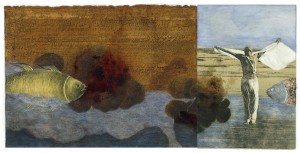
Verbal, Non-Verbal by Usman Ghouri. Image: ArtChowk Gallery
By Lilian Vercauteren
The island is the ocean floor folded, a piece of pale, sandy skin pinched between wind and tides. Time swept its soft flesh into a fortress with towering dunes in the waves’ image, smooth at times, rough and angular at will. A white beach rounds the island as a coarse, sabulous moat between the stronghold and the sea; a lover and a besieger.
Feathered guards patrol this no man’s land, tirelessly circling the windy corridors where their laughter and cries are lost to the empty sky and beach. Tourists flocked to these shores once, but they made their treks back home months ago. They relished the warm days, decorated them with striped umbrellas, lemonade stands and dips in the restless sea. She let them just for a while, until her fingers grew icy and started to pry toys out of children’s hands. They left when her moods turned capricious and she started reaching for their spherical creations in the sand, claiming back her beach without mercy, smoothing it over until all signs they were ever here are gone and forgotten; erasing, always erasing.
From their vantage points, the bastions of the dunes and the soaring passages of the sky, a garrison of gulls could easily dismiss the single figure standing on the beach for a mile marker, straight and unmoved by an equally unyielding January wind. They could write the man off for a large piece of drift wood, in its final resting place nothing more than bones for a body of nomadic sand. They could possibly mistake him for a mast, snapped from a ship lost, save for its spine. Mile marker, mast or man, like so many things that slipped away and turned from useful into garbage after wandering the sea for too long, the birds no longer look for –or care about– the difference.
But it is this particular wind, a sturdy south by southwest, who carries the sea’s outcasts onto these beaches. It covers and uncovers what’s lost. It is this wind remembering the forgotten. And its sharp edges that dig and build, cut off his breath as the man strains his eyes at a seesawing ship on the horizon. He checks his compass and knows that the captain is headed for mainland. He secures the buttons on his collar, leans into the wind and his footprints continue an irregular stitch in the sand. His eyes are now focused on different shapes, what sticks out or appears in front of him, fully exposed or half buried. He feels it misshapen under his shoes, calling him for a second look. He knows, he could easily mistake a piece of strong, non-silt bitten rope which he could use to tie something to his bicycle, or stop the back door from clattering at night, for useless frayed tackle. A thick rubber band at his feet is perfect around the cracked plastic case he keeps his watch in- found on this beach and of most definitely Japanese make, according to the island’s jeweler who doubles as chimney sweeper. A small pocketknife, also from this beach, cleans the calcium off a clothespin. To all things that are lost or left here he is their last chance, but although solid ebony, he abandons the smooth wooden board as it will be nothing but ballast.
The seagulls repose their heads while he retraces a few steps, picks up a rare whelk, taps it against the sole of his shoe, turns it round and round in his hands while checking its integrity. Saved for now from pulverizing, it will be the star of a windowsill parade between the tarred toy soldiers, rusted knifes riddled with sea pocks, a broken sundial, cracked wooden pulley strops and orange twine twisted into Turkish knots. The birds call and answer, while he kicks against empty glass bottles. They clunk and roll in front of his feet along the fringed shore line; the deep blue one crusted with gray sand, the green with black kelp tangled around its neck as if to force it to spill its murky contents at his feet; sea water, never love letters.
Above her head many V shapes float, dive and soar, navigating the wind’s harsh tides. A woman pulls her scarf up higher, her head hurts from the relentless wind that whistles in her ears. She watches the waves closely. How forceful and decided a wave is as she rolls in, but at her peak when her edge is curved and frayed in white, she holds her breath. That’s when for just a beat, she transforms into transparent dark green glass, fragile and thin, right before she shatters on shore where her only purpose is to make room for the next.
On her right, the beach stretches out until the dunes rise in the distance. She hasn’t seen a human being in hours but now a single figure approaches on the horizon. When she squints it seems they are walking on a cloud, though she wouldn’t mistake the force of the wind, its dance with the sand as the foundation of the ground beneath her, for anything aloof.
The man pays special attention to ribbons lacing the sand. They often are wrapped around a lump of torn up plastics or around a tuft of dune grass, like a hair tie around a playful ponytail. But these ribbons could be stapled to a card from a small town balloon contest. Most of these cards get lost soon after the balloon shreds in the wind. They end up in landfills. Shrivel in rain gutters. In rivers. In trees. They compost, they vanish. But once, he found one.
The balloon had traveled more than a hundred and eighty kilometers before crossing the sea and was buried on the eastern shore of the island beneath a pile of netting, split buckets, fish bones and a bird skeleton. The shreds, the string, the card, it was all there, preserved perfectly in its nest of waste. It was almost a year old, faded, but still legible. He often imagines what the disbelief and excitement sparkling the child’s face with the unsteady handwriting must have looked like. After it was destined to be lost, it came back accompanied with the coordinates from its final destination, the particulars of how and when it got there a mystery shared between two strangers. And so, dutifully he pulls and pulls on a ribbon that grows like a loose thread from a spool until he realizes it is part of fishermen’s netting and he leaves it to tear and decay, not for a while but eventually. Because on this beach, nothing can outstay its welcome.
His pace slows. The lines around his eyes deepen. There are no more mile markers from here until Easternend, he knows. Findings are often scarce on this side of the island, and therefore, often ignored. And yet, a small dark vertical stripe interrupts the blank distance. He has to look away for a moment for respite from the wind and the stinging. His right hand folds around the small monocular in his pocket but he reconsiders. He wants the beach to reveal what’s coming on its own terms. Whatever it is, he doesn’t need to unearth it, it will catch up with him like time and tides, unstoppable and certain. His jacket rattles in the wind and the stripe grows, as if someone took a black pencil and slowly draws a line upwards on the horizon. It widens and rounds, splits at the bottom.
He is a man, she sees now, his stride is long and willful, though slowed somewhat by what can only be age. All he seems to have eyes for is the ground. He stops, bends over, studies, kicks something near his feet and walks on. Could any of the broken and bent jewelry, dulled cutlery, cracked porcelain, faded toys and salt soaked art in the island’s small, filled to the brim, beach combers’ museum be his discoveries? She looks down and sees nothing but sand, a creamy sea of what is left of once enormous boulders and rocks pushed around and ground down by glaciers.
The seagulls too, watch the gap closing from above, the two sets of footsteps drawn towards each other in a stippled line. Could she be his daughter, coming back to the beach where they used to crunch Atlantic jackknives beneath their feet as they upturned pieces of driftwood, dreaming of pirate’s treasures? When mermaids’ lullabies could be heard under the breath of summer zephyrs and when ordinary shells turned into gems in her hand? They used to spent long summers here, the birds nod, before innocence turned into sense. Before time eroded this family, wore and tore it down until it crumbled to pieces; it came apart into grains of sand that slipped through their hands too easily, too small to hold onto.
He sees her long hair is dancing undulated, just like she was, on little pink toes tiptoeing in the frigid water. She sidesteps something at her feet, because he had warned her from the purple and blue jellied globes, their beauty one that stings and betrays, he taught her that.
The beach is dotted with giant collapsed blue and purple marbles. Jellyfish, she wonders, do they die because they wash up here, or did they die and then wash up? The shear of a crab sticks out of the sand, as if it had made a last, petrified effort before it was buried. The breaking of thousands of shells snap underneath her shoes. If it wasn’t for the ocean, or that man in the distance, this might as well be an inhabitable moon, the woman considers. And she might as well be the last human left.
On an empty beach the distance between two sets of 8-shaped holes punctured deep into the wet sand grows smaller. Soon they will well up with tide water and be dissolved by nightfall. The wind will whip, the sea surge and the birds will look for food until dark, not at how each pair of footsteps is now joined by the opposite pair as she passes him, and he her. She nods. And for a moment, he allows himself to remember the sun sparkling off the water, to feel the warmth on his face, the kind side of the wind, white feet in the sand. He knows, he can’t will it to be the greatest discovery he will ever take from here. But he searches the shapes of her face like he searches the sand. Because the possibility of finding something that deserves to be found is there. Something that takes more than a well-trained eye to find. And for that rarest of chances, he lives.
Lilian Vercauteren was born in Naarden, a small star-shaped city near Amsterdam. She flew to the US at age 22 for one year. Eight years later she lives in Tucson and works on a mint farm. She has studied at the Writers Studio and is working on her first novel. She recently had fiction published in the Lowestoft Chronicle.




